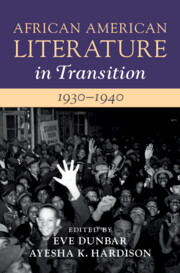Book contents
- African American Literature in Transition, 1930–1940
- African American Literature in Transition
- African American Literature in Transition, 1930–1940
- Copyright page
- Contents
- Figures
- Contributors
- Preface
- Chronology, 1930–1940
- Introduction
- Part I Productive Precarity and Literary Realism
- Part II New Deal, New Methodologies
- Part III Cultivating (New) Black Readers
- Part IV International, Black, and Radical Visions
- Chapter 9 Democracy Unfinished: African Americans Writing “Africa”
- Chapter 10 Langston Hughes and the 1930s: From Harlem to the USSR
- Chapter 11 Black Cultural (Inter)nationalism
- Index
- References
Chapter 9 - Democracy Unfinished: African Americans Writing “Africa”
from Part IV - International, Black, and Radical Visions
Published online by Cambridge University Press: 25 March 2022
- African American Literature in Transition, 1930–1940
- African American Literature in Transition
- African American Literature in Transition, 1930–1940
- Copyright page
- Contents
- Figures
- Contributors
- Preface
- Chronology, 1930–1940
- Introduction
- Part I Productive Precarity and Literary Realism
- Part II New Deal, New Methodologies
- Part III Cultivating (New) Black Readers
- Part IV International, Black, and Radical Visions
- Chapter 9 Democracy Unfinished: African Americans Writing “Africa”
- Chapter 10 Langston Hughes and the 1930s: From Harlem to the USSR
- Chapter 11 Black Cultural (Inter)nationalism
- Index
- References
Summary
While “Africa” historically figured as a fulcrum in African American literature for interrogating Blacks’ sociopolitical status in America, by the 1930s this relation had distinctly sharpened. Black American responses to the Italo–Ethiopian War (1935–36) and to Marcus Garvey’s failed populist “Back to Africa” campaign demonstrate how the 1930s marked a crucible in Black radical thought: civil and economic rights took on a global cast; colonialism and imperialism were read as patterned acts of aggression against Black and brown people; and US segregation emerged as yet another name for and variation on fascism. By the 1930s, Black Leftists almost obsessively attended to the racialized failures and frustrations of this historical moment in an effort to imagine and articulate new, pragmatic, and at times revolutionary strategies for addressing the Negro problem on a domestic and a global scale. The 1930s are bookmarked by attempts to both historicize Blackness and Black achievements on a micro and macro scale and concurrently imagine a way forward toward democracy.
Keywords
- Type
- Chapter
- Information
- African American Literature in Transition, 1930–1940 , pp. 265 - 295Publisher: Cambridge University PressPrint publication year: 2022

